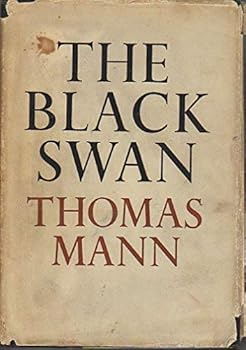The Black Swan
Select Format
Select Condition 
Book Overview
Thomas Mann's bold and disturbing novella, written in 1952, is the feminine counterpart of his masterpiece Death in Venice. Written from the point of view of a woman in what we might now call mid-life crisis, The Black Swan evinces Mann's mastery of psychological analysis and his compelling interest in the intersection of the physical and the spiritual in human behavior. It is startlingly relevant to current discussions of the politics of the body,...
Format:Hardcover
Language:English
ISBN:0394417089
ISBN13:9780394417080
Release Date:June 1954
Publisher:Alfred A. Knopf
Length:141 Pages
Weight:0.15 lbs.
Customer Reviews
5 ratings
Search for Love
Published by Thriftbooks.com User , 20 years ago
It is Mann's final novella. It is a twist on the matter of deceitfulness. The greatest deceit is self-deceit. The story was inspired by an anecdote given to Mann by his wife Katia according to the forward by Carlos Baker. The setting of the story is the 1920's. Rosalie is a widow and a Rhinelander. Her daughter Anna, nearly age 30, is her dearest companion. Her son Eduard, considerably younger than Anna, wants his mother to hire Ken Keaton, a young American, as his English teacher. His mother accedes to his wish. Rosalie is vivacious in Mr. Keaton's presence. She is beginning to lose her heart to him. Rosalie possesses self-knowledge, she is ashamed. Rosalie comes to rejoice in her torment. Her son and daughter see the situation and her son says to her he has learned a sufficient amount of English and the services of Mr. Keaton are no longer required. During the social season Ken Keaton is seen in other people's houses. Rosalie confesses to Anna that she loves Ken Keaton. Anna points out he has little to inspire such passion and suffering. She characterizes her mother's enchantment as absurd. Rosalie is led to use restraint so that under no circumstances would young Eduard feel compelled to defend her honor. She misreads her own physiological state. She has come to believe that her love has wrought a change in her middle-aged condition. Her death is swift. During the last hospitalization she remembers the black swan. The formality of the language employed is notable. The descriptions of Rosalie's malady may be held to be excessively clinical.
Another Beautifully Done Mann Masterpiece & Accessible TOO!
Published by Thriftbooks.com User , 22 years ago
Perhap's the Master's shortest and most unusual novella, here we see yet another side to this early 20th Century Genius. A study of a middle aged woman slightly deluded about her aging charms with a daughter who seems to sympathize, but really knows better. As usual, some great descriptions of nature, medieval castles, and philosophical discussions between the two. Mann's seeming obsession with the hidden decay of the body, and perhaps German culture and society, are crystal clear. The writing, even in English, is among his most mesmorizing. Really is there any doubt he is the GREATEST 20th Century Writer?!
Is there a doctor in the house?
Published by Thriftbooks.com User , 23 years ago
Although Thomas Mann is probably best known for writing about the conflict between the artist and the non-artist and death versus life in all of us, he is also fascinated by the concept of diesease and the way it treats the human psyche. When, at the end of this (very short) novel, the doctor cuts the protagonist open and sees she is dying of cancer, the "tea leaves" he looks at frightenly trace her roller coaster emotional life for the past six months. HOWEVER, the doctor also has some theories, about menopause, estrogen and cancer, which--largely because of the addition of two Latin words, I was UNABLE TO FOLLOW. In short, I only understand PART of the end of this book! At the end of his life, Mann has defeated me in both English and German.
Not Mann's best but still excellent
Published by Thriftbooks.com User , 24 years ago
The storyline of The Black Swan is simple: the widow Frau Rosalie von Tummler does not take well to menopause, seeing it as the loss of her womanhood. She hires a young American to tutor her son in English, falls in love (or at least lust) with the tutor, ...The root of the story, however, is conflict with nature - Rosalie is enlivened with a love of nature, a nature that betrays her in her daughter with a club foot, in menopause, in uterine cancer ...An excellent study of a subject that was somewhat taboo when this book was initially published.
deliciously dark
Published by Thriftbooks.com User , 25 years ago
I loved this book though Death in Venice was much better. A good, quick read that will leave a bittersweet impression.





